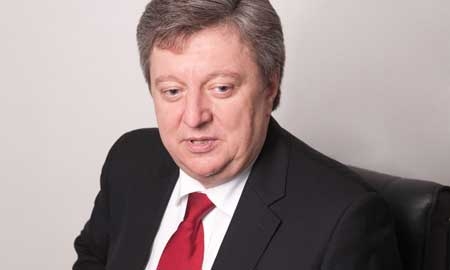An advisor to the president and senior advisor at Alfa-Bank, Roman Shpek, feels that the International Monetary Fund’s support of Ukraine’s macroeconomic, fiscal, budget and policy is vital. “It is not just about access to money but it is about recognising economic reform as well,” he says. “The President and the Independent National Bank are crucial for Ukraine. President Yanukovych correctly determined the course of reform and he determined the long-term goals.
Alfa Bank (Alfa), a Ukrainian universal commercial bank headquartered in Kiev that has been assigned ratings by Standard & Poor’s and Fitch Ratings CIS Limited, shares the national strategic goal of European integration, which Mr Shpek believes will lead to an improvement in “living standards and labour productivity, as well as environmental protection and healthcare, etc.”
Mr Shpek is confident that “joining the EU will make Ukraine a more open, democratic and competitive state.” The first necessary step however towards becoming a member of the common market will be to increase private investment in the country as, according to Mr Shpek, “Ukrainians do not just need money, we need new knowledge, new technology and access to new markets.”
Ukrainians do not just need money, we need new knowledge, new technology and access to new markets.” Roman Shpek,
Senior Advisor to
Alfa Bank |
To achieve its long-term goal of forming part of the G20, Ukrainian market experts have calculated a required indispensable economic growth of 9 to 11 per cent. “We have the greatest potential in the agriculture sector. We need to attract investment banks and corporate banks; this will help to increase domestic consumption,” says Mr Shpek.
According to Alfa’s senior advisor, to date approximately 68 per cent of Ukrainian GDP goes to exports, a positive contribution to the country’s economy, though domestic production and consumption have decreased. Structural reform and privatisation to increase competitiveness could be key in drawing investments to boost domestic trade.
Regarding the issue of non-performing loans within the Ukrainian banking system, Mr Shpek affirms that the matter has been tackled and confidence in the sector restored. “The level of deposits in Ukrainian banks has increased significantly and the level of credits in the economy has increased as well. Now all bankers and government officials are working together to reduce the level of non-performing loans,” details Mr Shpek.
As Ukrainians pump money into their banks, foreign investors have made the country’s agricultural and energy sectors their targets. “We will start to privatise energy generation companies this year and we will continue to privatise energy distribution companies. We have special green tariffs for renewable energy and a lot of companies from Germany and Spain are looking at the possibility of investing in wind and solar energy,” adds Mr Shpek.
Presently, the EU is Ukraine’s biggest trade partner, followed by Russia. New technology and electronic equipment come mainly from the European Union or the US, while most of the country’s energy sources, including gas, metal and oil, come from Russia. “Thanks to President Yanukovych we have significantly improved our political and economic relations with Russia and our trade has increased. This is very important because it has opened up the Russian market to Ukraine for the building industry and the food processing industry,” explains Mr Shpek.
Infrastructure developments, resulting from preparations for the upcoming Euro 2012 football tournament, will have a positive boost on local consumption and possibly unbolt the Ukrainian market to the EU. “There is a lot of good food in Ukraine and lots of good, small restaurants with international cuisine and good service, ” notes Mr Shpek, optimistic that the influx of tourists will create a consumer trend in Ukraine that will stick with the Ukrainians.
Regarding economic trends and movements, the UK is one of Ukraine’s reference markets. “London is the world financial centre and the UK is a very important part in the political, financial and general economic sense because there are a lot of British companies operating over here,” says Mr Shpek.

0 COMMENTS